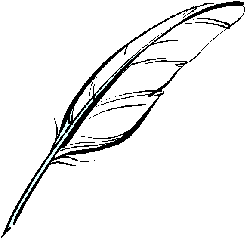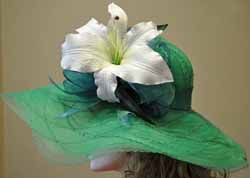The Finger
A Short Story by Nicola Trwst
© 2011 – Nicola Trwst
All rights reserved
The Finger illustrates the anguish of Italian immigrants gathered to bury an old friend when an unconceivable accident occurs…
****
The Finger was selected by the San Francisco Writers Conference for inclusion in their 2006 anthology: Building Bridges from Writers to Readers.
The anthology, compiled and edited by Elizabeth Pomada and Michael Larsen, can be found at lulu.com
****
The Finger
Green. Emerald. Bold, with a sweeping ostrich feather aimed to the rear. Rosina’s colorful hat hides her long, dark curls. A puff of green mesh surrounds the hat’s contours and softens angles that otherwise would look harsh. Except for the wide brim, which dips to conceal swollen, red eyes, the hat reaches up and outward in its glory balanced by Rosina’s statuesque posture.
Rosina enters the mausoleum, its pink marble walls entombed with crypts of departed souls—mothers, fathers, sisters, brothers, aunts, uncles, grandparents—all loved by someone. Each crypt is engraved and decorated with silk flowers, which have long replaced their real counterparts from burials past. The air is odorless, sanitized, making the fake flowers look all the more pitiful.
She strides down the narrow corridor, her stiletto heels, silent on the carpeted runner. Her head is held high; her eyes are guarded, focused ahead on the mourners huddled between the towering mausoleum walls. Her designer suit, a lighter shade of green than the hat, hugs her still slim figure in a way unbecoming the occasion. At sixty-two, her chic, appearance provokes jealousy among women much younger. A gasp. A cough. Whispers hiss as she approaches. Almost with pleasure, she accepts the scrutiny, slipping into the standing crowd.
“Not even forest green,” Gabriela whispers to Concetta Labasso. Both women stare at the sacrilege.
“Poor Vincenzo,” Concetta says, making the sign of the cross. “Hopefully, he’s someplace where he can’t see how she dishonors him.”
Rosina smirks. She tilts the hat in their direction, balancing its weight with her poise. “What do you know of Vincenzo?” she asks. “For that matter, dear Concetta, why are you here?” Indignation tenses Concetta’s shoulders and she angles her back towards Rosina.
“Tzzzzzz,” voices jeer.
Rosina, too, turns away. These women were strangers to Vincenzo. They were but a breath in the opera of his life. They come here dressed in mournful black. They don’t even know his favorite color.
“I love when you wear green, Rosina. The color lights up your eyes and your eyes light up my heart,” he had said. “Promise me, you will only wear green for me.”
When had he spoken those words? That night we’d kissed behind the church? Or the day of my sixteenth birthday when he gave me the gold cross? No, no, it was at Concetta’s party, when papa caught us holding hands.
Rosina’s hand travels down her thigh, stung by the memory of papa’s beating so many, many years ago. The wounds had long since healed, but papa’s words had ruled her life.
“No daughter of mine will be ruined by a Taraborrelli boy!” And why not papa? Why should your stupid Sicilian feuds rob your children of happiness?
Well papa, Vincenzo is with you now, and your beating worked to break us apart, not because you frightened me, but because when Vincenzo saw the swollen welts and broken skin beneath my school uniform, he knew the shame and pain his love had caused. No matter how I pleaded, begged even, he would not come near me again.
He married Maria, a bride chosen by his father—your enemy. Look at her wailing, held up by daughters that should have been mine. Because of you, papa, I left Montreal. I hoped to forget Vincenzo and his new bride, hoped to forget the gentleness in his eyes when he held me, hoped to forget what it felt like to love.
You said my love for Vincenzo dishonored you. Then I have dishonored you my whole life, papa, because I never stopped loving him, and although he married Maria, he never stopped loving me.
Rosina draws in a breath. Voices still. Heads turn as five funeral attendants roll a coffin towards the mourners, the alternating squeak of one dolly wheel reverberates off the marble walls. The attendants lift the coffin from the dolly and place it on a hydraulic lift, which will raise Vincenzo to his final resting place—crypt C4. Two attendants leave with the noisy dolly in tow.
Rosina’s gaze travels over the aged faces around her, but she sees past the added puckers of skin, the tired disillusionment, and remembers them as children—neighbors. I was a part of them once. We share Sicilian blood, but little else. They continue the old ways, while I’ve become a Canadian. Time has magnified our differences, and it is too late for understanding, or forgiving.
Antonio, Vincenzo’s only son, mounts the hydraulic lift. His cousin mounts the other side and signals the operator that they are ready. A click, then the low hum of an electrical motor invades the silent corridor. The widow cries, and folds against the oldest daughter.
Antonio’s hand drops to the coffin like a caress. Rosina notices the hand, its shape, its size, so like Vincenzo’s. The coffin is brilliant, solid bronze and engraved by a craftsman. It honors Vincenzo’s memory that his children have spent their inheritance on his magnificent resting place rather than selfishly on their own needs. But Rosina alone knows that this is not what Vincenzo would have wanted.
She smiles bitterly and leans towards the woman next to her. “If Vincenzo were alive, he would strangle his children for their frivolity.” The woman turns away, makes the sign of the cross, and then steps forward, out of reach of Rosina’s blasphemy.
As if hearing Rosina’s words, Vincenzo’s widow drops to her knees, trembling. “You wouldn’t spend a dime to take care of yourself. You wouldn’t let me refill your prescriptions,” she accuses while the lift raises the coffin high into the air. Rosina clutches at her heart with both hands. She bows her head as if to pray, but she cannot pray. Her prayers were used up years ago.
“Now, look at you!” the widow cries louder, her voice strained. “What were you saving for? Death!”
The lift stops before the empty crypt, fourth in a row of six. Maria buries her head and weeps into a handkerchief. Others cry, too. Sniffles trickle beneath the rumble of cleared throats.
Ah, Vincenzo, my little “tirato.” Isn’t that what they called you in the neighborhood—a tightwad—but you weren’t cheap with me my love. Remember when I returned to Montreal ten years ago and broke my leg skiing with that younger man? What was his name? Oh, it doesn’t matter. I only did it to make you jealous, to show you that even aged, I could still attract a man. You were so gracious, Vincenzo. While others sent food, you sent four-dozen yellow lilies with two perfectly formed red roses in the center—lovers. The lovers I hoped we would finally become, but you still remained loyal to Maria. Listen to her wailing like a market vendor.
Remember the week you came to Toronto? When we met for lunch? Then lunch grew into dinner and after so much conversation, you visited my apartment. The night, we spent together. I wanted your love, but your vows to Maria stopped you. We shared what we could. Your hands gave me what I craved from your body, while you remained faithful to a woman you didn’t love.
Antonio and the cousin lift the coffin and shove it across the rollers into the rectangular cavern. The lift returns to floor level where two men load it with the tools needed to seal the crypt. Three women at the front of the crowd prepare the flowers from the church—dahlias, Black Magic roses, zinnias—all scentless, but the color of jewels.
Rosina watches Antonio and the cousin lift the heavy marble cover-plate with Vincenzo’s date of birth and death chiseled into it. Again she notices Antonio’s hands, large and strong like his father’s—so like his father’s. Her face flushes, but she does not look away.
The daughters struggle to pull their mother from the floor, but her grief is too heavy. They leave her bent, crying, and accusing.
Again, the lift rises and stops before the crypt. The cousin caulks a metal plate over the opening. Next, Antonio applies a metal tape around the edges and the crypt is sealed, airtight. Both men reach under the huge marble cover plate to raise it, but the lift chain shifts from the imbalance of weight. Antonio cries out in pain.
Then he screams, “My finger! My finger!”
At the same moment he wrenches forward, an object strikes the broad brim of Rosina’s hat; so light the tap, she barely notices. Antonio drops his hold on the cover plate and because it’s too heavy for the cousin to hold alone, the marble falls from the lift, hits the carpeting below, and shatters.
The widow leaps to her feet, hands raised above her head. “It’s a sign,” she cries. “He doesn’t want to leave us.”
The crowd stiffens not understanding what has happened. Then Antonio raises the bloody stump of his middle finger. A united gasp rises from the crowd. Concetta Labasso crumbles to the floor, her legs splayed. Several hands reach to lay her straight, to take her pulse, and pat her cheek. Rosina steps backward, packing the rear with the rest of the congregation.
Two men check the lift chain where Antonio caught his finger, but don’t find the missing piece. Mourners check below their feet, afraid of squashing the flesh and bone. The lift is lowered.
Remembering the impact, Rosina rolls her head slowly from side to side. She senses a slight shift on her hat, an object weighted on the felt brim, probably tangled in the mesh.
“Call an ambulance!” Maria shouts. Antonio passes out on the floor beside the widow, his bloody stump wrapped in a necktie.
“This is crazy, let’s get out of here,” the man behind Rosina says.
“But the flowers,” his wife says.
“I’m leaving. Capisci?”
Up front, the cousin leafs through silk flowers, adorning other tombs. He peeks between each petal, careful of the blooms. Others crawl across the carpet on their knees, their hands patting the space around them.
“I’ve found it, I think I have it!” a man calls, standing with his hand cupped. The other searchers crowd around to look at his treasure.
“That’s not it. Don’t you know the difference between a cigar butt and a finger?”
The men back away, scouting the carpet beneath each footfall. Several squat for a closer look.
Tears travel Maria’s cheeks as she cradles Antonio’s head in her lap. She strokes the arm of his injured hand, willing it to heal. Rosina watches, and again, thinks of Vincenzo.
I was never as loyal as you, my love. My petty jealousies always blocked the way, but I did love you.
Paramedics scurry in, carrying a stretcher. “Have you found the finger?”
“Not yet,” the cousin says.
“We must find the finger. Anyone not looking, clear the mausoleum.”
With permission granted, several people rush the door. Others move to the front, joining the search. Rosina pauses, tilts her hat, and feels the object slide forward. She angles her head, leveling the brim, and turns towards the exit.





Full of insight and glimpses into a love lost but never forgotten.
Fell out of bed feeilng down. This has brightened my day!
Glad you enjoyed it.
Thanks Frances. That seems to be a theme of mine.